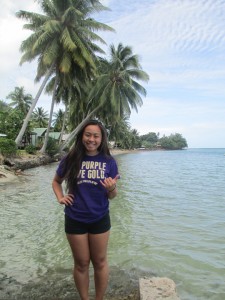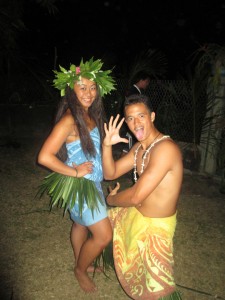This is Tahiti
By Midori Ng

“Bonjour”, “La Orana”, and “Hello” surrounded us as we disembarked the airplane and into the overwhelming humidity. Since I only speak English, I was immediately culture shocked with the French and Tahitian languages. The LePendu’s were our host family who warmly welcomed our UW group of 22 students with flower lei’s, shell necklaces, and friendly kisses. This marked the beginning of my Office of Minority Affairs and Diversity (OMAD) study abroad journey in Tahiti for one month, exploring the towns of Punaauia, Fa’a, Papeete, and Moorea.
A small island with an even smaller population, Tahiti is home to natural wonders of sandy beaches, exotic flora and fauna, and clear blue ocean waters. To the outside world, it is known as paradise. However, many people never truly experience the aspects of Tahiti that make the island so alluring and captivating.
Our journey focused on making connections within the Polynesian community and learning about the Tahitian culture beyond the stereotypes and pre-perceptions. We spent weeks studying the traditional Tahitian canoes Polynesians used to voyage across miles of ocean during migration through guest speakers, readings, and discussions. Afterwards our group canoed in open water, swam with stingrays, and learned to how to paddle board with the LePendu kids. This type of active learning was applied to multiple aspects of the Tahitian culture.

Heiva Dance Festival
During our second week, we attended the Heiva Dance Festival in downtown Papeete to watch an entertaining Polynesian show full of chanting, dancing, and singing. Afterwards, we got to partake and create our own Heiva festival, learning four dance routines, two songs, and a traditional chant within 48 hours to perform for the Punaauia community.
Volunteering at a kid’s camp and elementary school were the most rewarding experience of the trip. We spent all day with the children learning about their culture by weaving handmade baskets, making coconut milk, and preparing the dish E’ia Ota (Tahitian lime-marinated tuna). I also loved sharing parts of the American culture by playing basketball, soccer, and football with them. We also attended an American Football game between two local high schools to support the students the UW Athletic Football Department helped coach in June 2013. The football team performed the traditional Hakka dance for UW showing their appreciation of our support.
This was my first time out of the country and first time studying abroad. Through this program I realized the importance of slowing down and enjoying the moment being presented in front of you. Only staying for one month, every day was a new adventure and memory that would pass by too quickly.
Tahiti was an eye-opening study abroad trip that has no doubt changed my life. It is a destination that offers the greatest of simple pleasures rooted in a culture that values community, nature, and diversity. I found I am genuinely happy with Tahitian lifestyle of minimal accessibility to technology and materialistic items. More importantly, the LePendu family taught me a lot about living with a positive outlook, big heart, and open mind. As I am settling back into my life in Seattle, I am extremely grateful and humbled to have experienced the trip of a lifetime.
